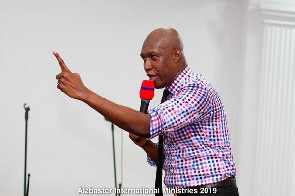Opinions of Tuesday, 5 September 2017
Columnist: Okota-Wilson Nicholas
Categorization of basic schools; an antidote to the disparity in our basic education
After writing the Basic Education Certificate Examination (B.E.C.E.) in Ghana,which is an external summative examination,conducted nationally for basic school pupils in their final year -, pupils are graded in accordance with their performance in the various subjects.
All pupils(candidates) who took part in the examination are graded on the same performance scale, Example, the marks 80 -100 gives a candidate grade one (1), 70-79 will give a pupil grade two (2) and so on.
It does not matter which part of the country the pupil is and the school the pupil attended,knowing well that not all the schools are having the same infrastructure and facilities. Even the number of teachers available in a particular school will not be the same as in another school.
Some schools are under trees. Some schools do not even have the necessary and adequate textbooks and other relevant materials. There is even disparity in the location of schools,that is, villages, towns and cities.
One can even talk about how motivated a child is depending on the home the pupil is coming from. It is not a good practice to compare pupils from different schools using the same criteria though the same syllabus is being used and the same examination is written. The differences in exposure and experience pupils have also vary.
It is no wonder that after junior high school, pupils from villages ,the towns and cities meet in a particular senior high school and the pupil from the city with aggregate nine(9) cannot compete academically with a pupil from the village with aggregate fifteen (15).
There is a problem with an external examination conducted nationally for classifying and placing students with varied socio-economic background .A student deemed as an average student in the village and in a school which lacks learning aids and infrastructure will excel marvellously with the necessary facilities and materials.
If all pupils are not enjoying the same infrastructure, facility and materials, why make all of them go through the same assessment mill? If the B.E.C.E. cannot be done away with, what should be the way forward?
An alternative is to categorize basic schools for the purpose of providing relatively accurate and enough information about students which will aid in their admission and placement in the senior high schools.
Schools can be categorized in terms of the number of teachers available in a school, school buildings, facilities like I.C.T. lab, library , the location: whether in a village, town or the city etc. So a school with the standard number of teachers required, a school building, I.C.T. lab, library, science lab and in a city can be a graded as a Grade ‘A’ school.
Another school without the required standard number of teachers but with a school building and a science lab can be a Grade ‘B’ school. So there can be Grade ‘C’ and Grade ‘D’ schools. With this in mind, a student in a Grade ‘C’ school will not be graded the same way as a student coming from Grade ‘A’ school.
It is there that if a pupil from a category ‘A’ school scores aggregate 6-10, it will be recognized as being equivalent to aggregate 6-16 of a student coming from Grade ‘D’ school which is in a village and possibly a school under tree.
Then, there will be some relative fairness in using the B.E.C.E. results to place pupils in the senior high schools. Other than that , pupils in the village and deprived schools will never get the opportunity to attend the presumed best senior high schools in the country .
But when there is that appreciation that a pupil from the village school having aggregate fourteen(14) is just as good as someone having aggregate eight(8) from the city with the infrastructure then, there will be relative fairness in the system.
The attention should not be so much on the surface of the B.E.C.E. certificate when admitting pupils into the senior high school; the background of the student should be considered. A situation is created in the country where depending on part of the country one comes from, he or she can never attend a particular senior high school let alone read a particular program in the university.
If one finds himself or herself from a village and completes junior high school with aggregate eighteen (18), none of these so called best schools will consider his or her background but will outrightly reject him or her even if it is a computerized placement.
This potential student will find him or herself in a deprived senior high school and once again struggle to pass with aggregate sixteen (16). This aggregate sixteen will deny such a potential an opportunity to read programs like Law, Medicine, Business Administration etc in the university.
All stakeholders of our educational sector especially administrators must help correct this anomaly in our education system which is depriving so many a genius to abilities and display their God-given abilities.
Okota-Wilson Nicholas
0541 55 6858
okotakwame7@gmail.com














